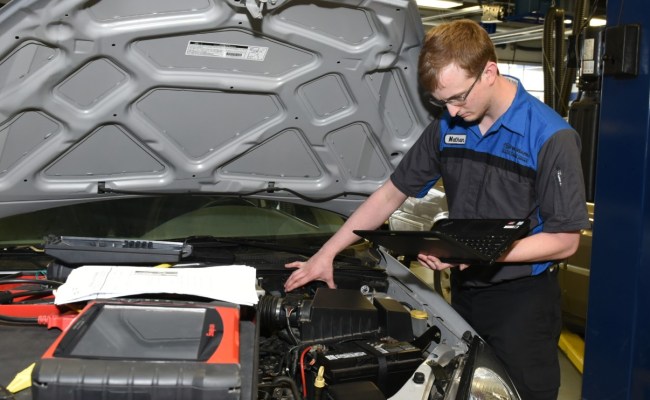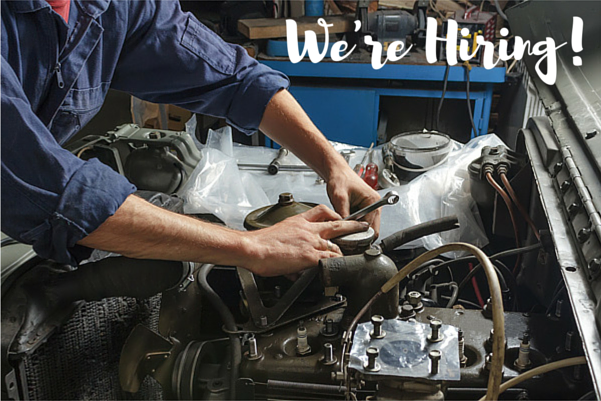
There are many steps that you must take when searching for a career in diesel mechanics. Earning a CDL in diesel mechanics or an associate degree is highly recommended. However, hands-on experience is equally important. National Institute for Automotive Service Excellence (ASE) also offers certification exams for diesel technicians. These certifications demonstrate your knowledge of diesel mechanics and can lead to higher salaries and more specialty jobs. Continue taking certification exams if you want to be a diesel mechanic. You'll be able to take advantage of more opportunities and receive higher pay once you have achieved master status.
Earning a CDL
The trucking industry is an excellent career choice for CDL holders, but it is not as simple as you might think. A diesel engine is crucial if you have ever worked on a commercial vehicle. During the recent pandemic, diesel helped the industry keep moving. While drivers are not always on hand, diesel mechanics are vital to the success of the industry.
If you're looking for a career as a diesel mechanic, you should consider earning an associate's degree. The degree requires courses that include math, science, and business. Some employers may require certification through the National Institute of Automotive Service Excellence. You can apply for jobs in companies that require certification after you have earned your degree. This certification will allow you to stand out from the rest of the job seekers.

Earning an associate degree
Strong people skills are essential for becoming a diesel mechanic. This includes being able to communicate effectively and efficiently with clients, coworkers, management, and customers. You will need to be able to translate complex technical concepts into simple language and clearly communicate your findings and solutions to customers and clients. Diesel-powered vehicles can be extremely complex and intricate. Even the smallest wire or bolt can cause major problems. You need to be sharply aware of every detail.
It is essential to understand the requirements of this profession before you begin your education. A high school diploma is generally the minimum requirement. An associate degree is required. A GED might be acceptable. To further your education, a trade school can offer you a certificate program. A certification will give mechanics an edge over those with less formal education.
Earning a Certificate
Although a certificate in diesel mechanic is not necessary to start working in this field it can help you get an entry-level job. Entry-level jobs are not difficult, but they can increase your skillset and help you land a full time job in the future. The entry-level job gives you practical experience that can make you stand out among other workers in the industry. For those who are uncertain about their future or want to have a more secure career, a certificate is highly recommended.
Many individuals choose to pursue a career in diesel repair after they earn a certificate. Employers are more likely to accept this type of certification. You may also be eligible for higher-level jobs once your training is complete. Even though you won't make a full-time income until you gain experience, you could start a career as an diesel technician to improve the lives and livelihoods of others. An Associate of Applied Science degree is a good option if you are looking for a higher-level position.

Getting hands-on experience
A certificate in diesel mechanic training is a good option if you are interested in learning more about large trucks and machinery. The National Center for Construction Education and Research provides credentialed students with extensive resources and aides to help them pass their assessment. In addition to hands-on instruction with real vehicles, the program allows you learn from professional professionals.
Diesel mechanics work on heavy trucks, such as semitrucks or buses that transport goods all over the country. Diesel technology can also be used on other vehicles, and many machines. They typically use pneumatic tools, hand tools, and power machine tools to repair and maintain these vehicles. Some technicians use computers to diagnose and repair problems. To make repairs, they also use hand tools as well as computerized equipment. This job requires long hours of standing, crawling, walking, and being exposed to various weather conditions.
FAQ
What qualifications do you need to be a mechanic?
You will need to pass several exams in order to become a mechanic. These include:
-
A general knowledge assessment
-
A practical examination
-
An apprenticeship test
These tests will ensure you are familiar with the fundamental concepts of mechanics and physics before starting to work as a mechanic.
Once you pass these tests you can become a mechanic. You will still need to complete an apprenticeship. This will involve trade training.
To be able to repair vehicles, you'll need classes or workshops. It will be necessary to work alongside experienced mechanics.
A mechanic must be highly focused and attentive to detail in order to succeed. You'll need to pay close attention to every aspect of vehicle repairs.
To become a successful mechanic you'll need patience. This may not be the career path that you want if you aren't able to follow directions.
If you enjoy cars and fixing them, this job could be a good fit for you.
Is it worth being a mechanic.
The answer to this question will depend on your goals for life. If you are looking for financial gain, then yes. However, if purpose and meaning are what you seek, then no.
You don't need to be a mechanic if you don't know how. It's not going make you millionaire. It's unlikely that you will be famous. It is unlikely that your life will change.
It would take you years to learn how to do everything correctly. Then you'd still have to pay someone else to fix your car when it breaks down. It's the reason most people don't bother. They find something better.
To sum up, if you want to earn lots of money then go ahead. You can't live a meaningful existence if your goal is to make a living in the mechanic's business.
What does it take for a mechanic to be a good one?
To become a skilled mechanic, you need years of experience and practice. A professional mechanic will teach you how to fix cars.
You will need to spend some time in a garage to learn as much about cars and mechanics as possible. It is important to get familiar with the mechanics of cars and engineering.
Furthermore, you'll need to enroll in auto school.
It is important to get started early. It doesn't matter if you're old or not to study automotive technology. Get started now if you are interested in becoming a mechanic.
How long is an automotive course?
A three-year course in automotive is required.
The first year is dedicated to theory and learning about cars. The second year is spent on practical training where you learn how to drive, fix engines, and do other mechanical jobs around the car. The last year is spent at a local shop, where you will get practical experience with real-world problems.
Statistics
- The U.S. Bureau of Labor Statistics (BLS) reports that the job outlook for automotive service technicians and mechanics is expected to decline by 4% from 2019 to 2029. (indeed.com)
- 52% of Mechanics in the United States think their salaries are enough for the cost of living in their area. (indeed.com)
- According to the BLS, total auto technician employment is expected to exceed 705,000 by 2030. (uti.edu)
External Links
How To
How to properly diagnose your vehicle for repair
You should first examine the symptoms your car is showing to determine if it requires repairs. These steps will help you diagnose your car properly.
-
Check engine lights. The dashboard light indicators, including the engine light, oil pressure gauge, battery light indicator, coolant temperature gauge and RPM gauge, should be checked. It could indicate that your vehicle is having problems.
-
Take a look at the treads. Tires with worn treads could cause problems when handling or braking. It is also important to inspect the wheel treads. They should look clean and be smooth. It is best to take off the wheels and remove them. Use a flashlight to see how well the treads are worn.
-
Pay attention to the level of your brake fluid. You should always keep track of the amount of brake fluid in your vehicle. This will ensure that your brakes run smoothly. If the brake fluid level is low, your brakes might fail when you apply pressure to them.
-
Check the suspension system. Vehicles usually have a suspension system that helps absorb shocks and vibrations while driving. It provides better control and allows smoother acceleration and deceleration. Your vehicle might feel wobbly, or shake uncontrollably if it has a bad suspension. If you are unsure if your vehicle is suffering from a suspension problem, put weight on the front and rear axles to check the movement.
-
Examine the steering wheel. The steering column is used to link the steering wheel with the rest of vehicle's components. The steering column can often be damaged by an accident. You should replace your steering column if it feels loose or unstable.
-
Observe the exhaust pipe. The exhaust pipes transport gases from the combustion chamber to outside. Your cabin will be effected if your exhaust pipe cracks or leaks. You should also fix any bent tailpipes immediately.
-
Take a look under your hood. If you see anything unusual, take a look under the hood. There could be fluid leaking from your engine. In addition, if you notice an unusual smell coming from your engine compartment, you should contact a professional technician.
-
It is important to inspect the air filter. Your vehicle's air filter collects dust and debris from the outside environment. A dirty air filter causes your vehicle to run poorly. Replace your air filter regularly.
-
Check the fan belt. The fan belt that connects your vehicle to the transmission is called the engine fan belt. If the fan belt is damaged, the engine won’t turn. The process of replacing the belt is straightforward. All you need are a screwdriver & pliers.
-
You should inspect the radiator and hoses. The radiator hose carries water from the radiator to the engine. It can become cracked or damaged and leak hot liquid onto your engine. Repairing the hose is easy with a pair of needlenose pliers or a small wire brush.
-
Be sure to inspect your windshield wipers. Windshield wipers use electricity for snow and rain removal. If they stop functioning, they can leave streaks in your window glass. You can fix the problem by changing the washer fluid.
-
Check the battery cables. Your car's electrical system is powered by batteries. When you replace batteries, make sure to disconnect the negative cable first. Failure to do so can damage your alternator.
-
Check the headlights. Headlights help you see the road ahead. Bad visibility can be caused by headlights that don't work correctly. You can check the bulbs to make sure they aren't burned out.
-
Pay attention to the lights. You can warn other drivers if you approach them at night. If one doesn't work, it could distract you and lead to an accident.
-
Make sure you check your brakes. Before you have a collision, brakes slow down your car. If your brakes aren't working properly, you may lose control and crash into other cars.
-
Check the oil regularly. Your engine will stay lubricated by the oil. It helps keep metal parts from getting too worn down. It is recommended to change the oil once a month.